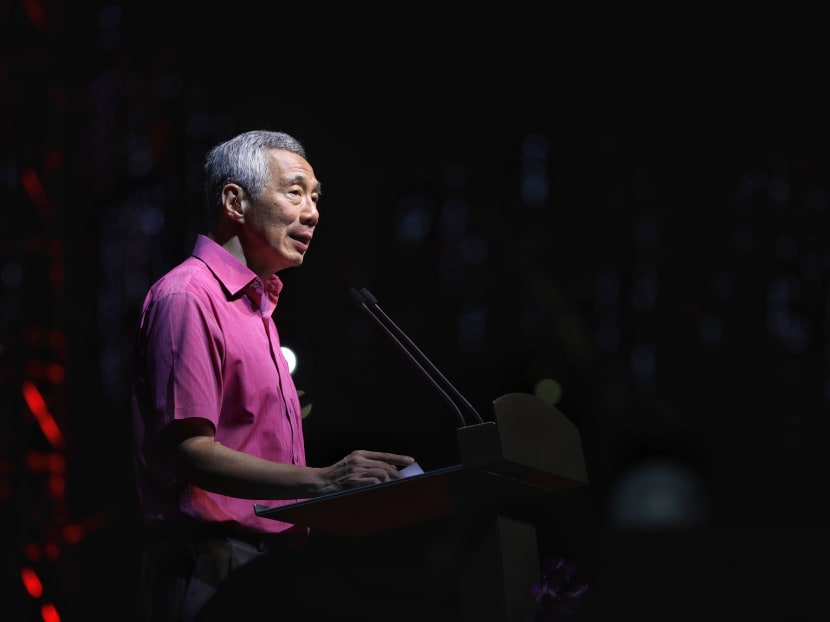PM Lee urges Hwa Chong students to understand context of Singapore society and their duties in it
SINGAPORE — Hwa Chong Institution, a Special Assistance Plan (SAP) school, has a special responsibility to promote Chinese traditional culture and values and help students master their mother tongue.

Prime Minister Lee Hsien Loong speaks at the 100th anniversary dinner of Hwa Chong Institution on March 21, 2019.
SINGAPORE — Hwa Chong Institution, a Special Assistance Plan (SAP) school, has a special responsibility to promote Chinese traditional culture and values and help students master their mother tongue.
At the same time, its students must connect with fellow Singaporeans of all races and religions and understand the context of Singapore society and their own responsibilities within it, said Prime Minister Lee Hsien Loong on Thursday (March 21).
“You must know how Singapore society works, identify with fellow Singaporeans of all races and religions, and feel a responsibility for your fellow citizens,” Mr Lee told 12,000 guests at the 100th anniversary dinner of the school.
“You need to feel a calling to participate in community and national affairs, to contribute to the society and system that has nurtured you, and to take on leadership roles to take Singapore forward.”
Speaking in Mandarin earlier, Mr Lee noted that Hwa Chong students already have adequate knowledge of other cultures and races in Singapore, even though there are few non-Chinese students in the school.
This is because the school has various programmes that provides its students with opportunities to interact with people from other background and races.
Maintaining these multi-cultural exchanges is vital in promoting cohesiveness and integration in Singapore's society. This is why every school, not just Hwa Chong, should advocate a spirit of open-mindedness and inclusiveness, said Mr Lee.
“Because this will help protect the multi-racial, multi-cultural foundations of our country.”
SAP schools have a special mandate to promote the learning of Chinese language and culture. Non-Chinese students can enrol in SAP schools, but they would have to take up Chinese as their second language.
Speaking at an event last month to mark the 40th anniversary of the SAP programme, Education Minister Ong Ye Kung noted that the more common use of English today, along with more specialised programmes to promote mother-tongue learning, “have led some to question the relevance of SAP schools.”
Some students have also lamented that they lack opportunities to make friends with people from other communities, he noted, though he cautioned against making “a drastic change to the SAP school system” as it remains relevant.
The SAP programme was set up in 1979 by Mr Lee Kuan Yew as Chinese-medium schools were facing falling enrolment. This was because the use of English became more dominant while Singapore developed economically and became more globalised.
The founding prime minister was worried that the disappearance of Chinese-medium schools would be a loss for Singapore as they not only kept valuable traditions, but also shouldered the responsibility of inheriting and imparting Chinese culture, noted PM Lee in his speech on Thursday.
“He wanted to revive the spirit of the old Chinese middle schools. These schools had emphasised character development, seriousness of purpose, and the spirit of community,” said PM Lee.
“These values not only served the old Chinese-school graduates well, but were important for the resilience and cohesion of our society. Mr Lee (Kuan Yew) wanted SAP schools to imbue these values in new generations of young Singaporeans.”
PM Lee also noted how changes in Hwa Chong through its 100-year history reflected wider trends in Singapore.
“You have witnessed many of the pivotal events in modern Singapore’s history,” he said, adding that the 1950s to 1960s was a turbulent time as Hwa Chong’s school grounds became a hotbed of anti-colonial and anti-government ideologies, some of them left-leaning.
“The Second World War, the fight for independence, separation from Malaysia — Hwa Chong teachers, students and alumni felt strongly about the big issues of the day and often participated passionately in them.”
He added that Hwa Chong’s story is “intertwined with the Singapore story” and the school has come a long way since it started with around 70 students in a small building on Niven Road.
Today, Hwa Chong has “built up an illustrious history and reputation” and maintained high academic standards, which are necessary for Hwa Chong to continue to thrive as an educational institution, said Mr Lee.
“If you can continue to do this — uphold high academic achievements, promote Chinese cultural values, and prepare students for our multi-racial, multi-religious society, you will have fulfilled your mission.”











